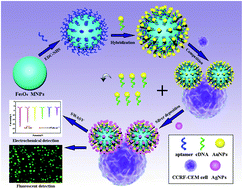
Ultrasensitive electrochemical detection of leukemia cells
Detecting cancerous cells, such as those of leukemia, in early stages can greatly affect patient treatment and survival. Current diagnostic tools such as immunohistochemistry require large concentrations of cells, which occur in advanced stages of the disease.
Jun-Jie Zhu and co-workers at Nanjing University , China, developed an assay for leukemia cells using aptamers in a unique, competition-based electrochemical sensor. This involves the use of magnetic (Fe3O4) and gold nanoparticles and the detection of electrochemical signals from deposited silver nanoparticles using square wave anodic stripping voltammetery. The gold nanoparticles bind to the much larger magnetic particles through an apatmer, but the apatmer has a higher specificity for the leukemia cells. Upon introduction of the cells, some of the gold nanoparticles are released from the magnetic surface affecting the amount of detectable signal from the silver. The researchers successfully detected as few as 10 cells and demonstrated a high specificity of the aptamers for only one type of leukemia cells. Although they chose leukemia cells, the only limitation is the specificity of aptamers available and ideally, any cancer could be tested for in this system.
To read the full article, please access the link below. This paper will be free to read for the next three weeks.
A novel aptamer-based competition strategy for ultrasensitive electrochemical detection of leukemia cells
Kui Zhang, Tingting Tan, Jia-Ju Fu, Tingting Zheng and Jun-Jie Zhu
Analyst, 2013, Advance Article
DOI: 10.1039/C3AN01255G










